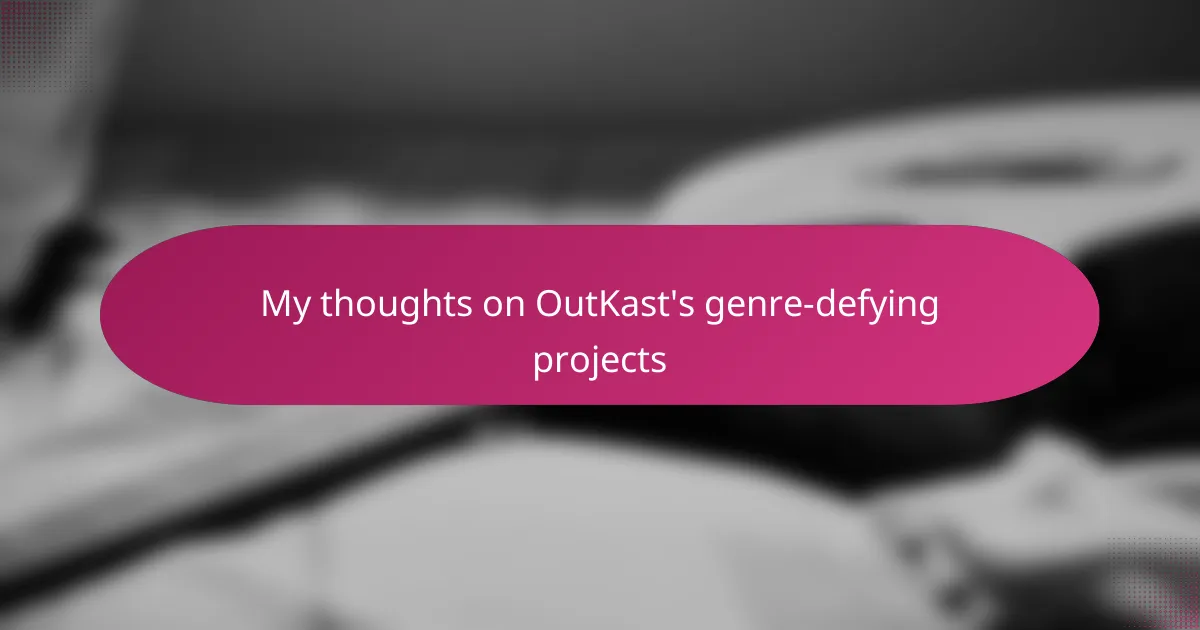Key takeaways
- OutKast blends diverse musical genres like funk, soul, and jazz, creating unique and unpredictable tracks that challenge traditional rap norms.
- The duo’s fearless experimentation and storytelling ability allow listeners to connect with their music on a deeper emotional level.
- OutKast has transformed the rap landscape, encouraging future artists to break free from genre constraints and explore creative freedom.
- Albums like “Aquemini,” “Stankonia,” and “Speakerboxxx/The Love Below” showcase their innovative approach and rich storytelling, appealing to a wide range of listeners.

Understanding OutKast’s musical style
OutKast’s musical style has always struck me as a brilliant fusion that challenges the norms of rap. They seamlessly blend funk, soul, jazz, and even psychedelic elements into their tracks—making each song feel like a unique experience rather than just another rap beat. Have you ever caught yourself listening to a rap song that sounds like an entire album in one track? That’s OutKast for you.
What I find fascinating is how André 3000 and Big Boi manage to balance their distinct personalities within their music. It’s like hearing two different worlds collide, yet the result is harmonious and innovative. This contrast makes their style unpredictable and, honestly, deeply relatable—I’ve often found myself connecting with their variety of moods and storytelling styles in ways other artists rarely evoke.
Moreover, their willingness to experiment with sound pushed me to rethink what rap music could be. They didn’t just follow a genre; they reshaped it by adding layers of complexity and emotion. It’s hard not to marvel at how their artistic bravery paved new paths in hip-hop, inspiring not only fans but also future musicians to break free from traditional boundaries.

Defining genre-defying music
Genre-defying music, in my experience, breaks the mold by refusing to be confined to one category. It’s the kind of sound that surprises you because it pulls from unexpected places, merging styles in a way that feels both fresh and authentic. Have you ever heard a song and thought, “Wait, is this rap? Or something else entirely?” That’s the magic of defying genres.
What really stands out to me about this type of music is its ability to evoke varied emotions and imagery without sticking to a set formula. It’s like the artist is painting with a broader palette, mixing colors you didn’t know belonged together but somehow creating a masterpiece. That unpredictability keeps me hooked because I never know what to expect next.
I also think of genre-defying music as a form of creative freedom—a rebellion against restricting labels that can box in an artist’s expression. When musicians blend sounds effortlessly, they invite listeners into a world that feels more personal and innovative. Isn’t that what artistry is all about: pushing boundaries and making something truly new?

Key elements of OutKast’s projects
One element that immediately comes to mind when I think about OutKast’s projects is their fearless approach to blending diverse sounds. It’s like they took the entire musical spectrum and played with it, creating textures and rhythms that were unexpected yet perfectly fitting. Have you noticed how their beats can suddenly switch from funky grooves to soulful melodies without missing a beat? That kind of fluidity is rare and shows their deep commitment to innovation.
Another key aspect I’ve always admired is their storytelling. André 3000 and Big Boi don’t just rap; they craft vivid narratives filled with personality and emotion. Listening to their albums, I often feel like I’m diving into distinct worlds shaped by their unique voices and perspectives. It’s their ability to balance introspection with playfulness that keeps me coming back for more.
Lastly, the experimental spirit in their production stands out the most to me. They’re not afraid to take risks—whether it’s using unconventional instruments or twisting traditional rap structures. This boldness keeps their music fresh and exciting, making every project feel like an adventure. Don’t you think that’s what makes their work timeless?

Impact of OutKast on rap music
OutKast’s impact on rap music has been nothing short of transformative in my view. They didn’t just influence sounds; they shifted mindsets about what rap could be. When I first heard their albums, I realized that hip-hop didn’t have to fit a mold—it could be a playground for creativity and expression.
I often think about how their success opened doors for other artists who felt trapped by genre expectations. Have you noticed how so many rappers today blend styles seamlessly? That’s a direct result of the groundwork OutKast laid. Their fearlessness in mixing funk, jazz, and soul into rap gave rise to a more diverse and vibrant hip-hop landscape, one I’ve personally found more exciting and inspiring.
What really strikes me is how OutKast’s music challenged listeners, including myself, to embrace complexity and depth in rap. They proved that commercial success and artistic innovation aren’t mutually exclusive. Isn’t that the perfect example of shaping a genre from the inside out? Their legacy to me represents not only change but also endless possibilities for rap’s future.

Analyzing my favorite OutKast albums
When I dive into my favorite OutKast albums, Aquemini always stands out for me. It’s like a perfect fusion of André 3000’s eccentric creativity and Big Boi’s grounded Southern roots, creating this rich tapestry of sounds and stories that feel deeply personal yet universally relatable. Have you ever listened to a track that makes you want to rewind it immediately just to catch every nuance? That’s Aquemini in action for me.
Stankonia is another album I find myself returning to, especially because of how it challenges the expectations of rap with its bold production and eclectic themes. The way OutKast combines political commentary with party anthems is something I admire—there’s this vibrant energy that keeps me hooked from start to finish. I remember first hearing “Ms. Jackson” and feeling a rush of emotions, from vulnerability to defiance, all wrapped in a catchy beat.
Then there’s Speakerboxxx/The Love Below, which I see as two solo projects that perfectly complement each other. André’s experimental, genre-blending tracks contrast beautifully with Big Boi’s classic Southern hip-hop style, showcasing their individual talents while still feeling like a unified OutKast statement. Don’t you love when an album surprises you with its variety and depth? For me, this double album captures that excitement and has become a personal favorite because of it.

Personal reflections on OutKast’s innovation
OutKast’s innovation always hits me on a personal level because it feels like they’re inviting listeners into uncharted territory. I remember the first time I heard a track where the beat didn’t just support the lyrics but seemed like a full narrative on its own. Have you ever experienced a song that challenges your usual expectations so deeply that it makes you rethink what music can do? That’s exactly the effect their innovation had on me.
What I find truly remarkable is their fearless refusal to stick to one formula. It’s almost as if André 3000 and Big Boi dared themselves—and us—to imagine rap as limitless. From my experience, that kind of boldness in music creates a space where creativity flourishes in unexpected ways. Isn’t it refreshing when an artist breaks the mold and still manages to connect emotionally?
Sometimes I catch myself playing their albums repeatedly, not just for enjoyment but to uncover new layers I hadn’t noticed before. That tells me their innovation isn’t just surface-level experimentation—it’s a deep, thoughtful evolution of sound and storytelling. Doesn’t music like that keep you engaged much longer than a typical rap album might? For me, it’s a lasting connection that feels both challenging and rewarding.
